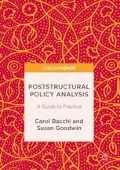Abstract
The Introduction articulates how a poststructural approach to policy analysis provides an important vehicle for questioning how governing takes place. It begins by sketching the broad parameters of a poststructural approach as a form of critical analysis that allows a refreshing skepticism toward the full range of things commonly associated with policy: policy itself, the knowledges that support policy and policy proposals, as well as conventional forms of policy analysis. The implication of this form of critical analysis for policy work is explained—how a poststructural approach encourages policy workers to reflect on their own role in governing and to engage in the productive and political practices of interrogating, theorizing, and resisting. The Introduction also sets out the structure of the book.
Access this chapter
Tax calculation will be finalised at checkout
Purchases are for personal use only
Notes
- 1.
The use of scare quotes to signal contingency is particularly important for the treatment of “problems”, since the book is concerned to put in question the common assumption in many approaches to policy analysis that “problems” simply exist and that their meaning is clear and uncontentious (see Chapter 4). Scare quotes will be omitted only in those cases where it is evident that a specific theoretical stance approaches objects, subjects, places, and problems as unproblematized “entities”.
Bibliography
Allan, E. (2012). Policy discourses, gender, and education: Constructing women’s status. New York: Routledge.
Bacchi, C. (2009). Analysing policy: What’s the problem represented to be? Frenchs Forest: Pearson Education.
Ball, S.J. (1990). Politics and policy making in education: Explorations in policy sociology. New York: Routledge.
Ball, S.J. (1993). What is policy? Texts, trajectories and toolboxes. Discourse: Studies in the Cultural Politics of Education, 13 (2), 10–17.
Ball, S.J. (1997). Policy sociology and critical social research: A personal review of recent education policy and policy research. British Educational Research Journal, 23 (3), 257–274.
Ball, S.J. (2015). What is policy? 21 years later: Reflections on the possibilities of policy research. Discourse: Studies in the Cultural Politics of Education, 36 (3), 306–313.
Brown, W. (1998). Genealogical politics. In J. Moss (Ed.), The later Foucault: Politics and philosophy. London: Sage.
Coffey, A. (2004). Reconceptualizing social policy: Sociological perspectives on contemporary social policy. Berkshire: Open University Press.
Feldman, G. (2007). Following or facing the governmental gaze: Academic and policy intellectuals in the early twenty-first century, Roundtable, Conference of the Canadian Anthropological Society—American Ethnological Society, University of Toronto, May 8–12.
Fernandez, B. (2012). Transformative policy for poor women: A new feminist framework. Surrey: Ashgate.
Gordon, C. (1991). Governmental rationality: An introduction. In G. Burchell, C. Gordon, P. Miller (Eds.), The Foucault effect: Studies in governmentality. Chicago: University of Chicago Press.
Harris, P. (1999). Public welfare and liberal governance. In A. Petersen, I. Barns, J. Dudley, P. Harris (Eds.), Poststructuralism, citizenship and social policy. London: Routledge.
John, P. (1998). Analyzing Public Policy. London: Routledge.
Lall, M. (2007). A review of concepts from policy studies relevant for the analysis of EFA [Education for All] in developing countries, Consortium for Research on Educational Access, Transitions & Equity (CREATE), Sussex.
Lall, M. (ed.) (2012). Policy, discourse and rhetoric: How New Labour challenged social justice and democracy. Rotterdam: Sense Publishers.
Lister, R. (2010). Understanding theories and concepts in social policy. Bristol: Policy Press.
Maddison, S., & Denniss, N. (2013). An introduction to Australian public policy: Theory and practice, 2nd edition. Melbourne: Cambridge University Press.
Miller, P., & Rose, N. (1990). Governing economic life. Economy and Society, 19 (1), 1–31.
Mol, A. (1999). Ontological politics: A word and some questions. In J. Law, & J. Hassard (Eds.), Actor network theory and after. Oxford: Blackwell.
O’Malley, P., Weir, L., Shearing, C. (1997). Governmentality, criticism, politics. Economy and Society, 26 (4), 501–517.
Rose, N., O’Malley, P., Valverde, M. (2006). Governmentality, Annual Review of Law and Social Science, 2, 83–104.
Shaw, S.E. (2010). Reaching the parts that other theories and methods can’t reach: How and why a policy-as-discourse approach can inform health-related policy. Health, 14 (2), 196–212.
Shore, C. (2012). Anthropology and public policy. In R. Fardon, T. Harris, T.H.J. Marchand, C. Shore, V. Strang, R. Wilson, M. Nuttall (Eds.), The Sage handbook of Social Anthropology. London: Sage.
Shore, C., & Wright, S. (2003). Policy: A new field of Anthropology. In C. Shore, & S. Wright (Eds.), Anthropology of policy: Perspectives on governance and power. New York: Routledge.
Shore, C., & Wright, S. (2011). Conceptualising policy: Technologies of governance and the politics of visibility. In C. Shore, S. Wright, D. Però (Eds.), Policy worlds: Anthropology and the analysis of contemporary power. New York: Berghahn Books.
St. Pierre, E.A. (2000). Poststructural feminism in education: An overview. International Journal of Qualitative Studies in Education, 13 (5), 477–515.
Sutton, R. (1999). The policy process: An overview. London: Overseas Development Institute.
Watson, S. (2000). Foucault and the study of social policy. In G. Lewis, S. Gerwitz, J. Clarke (Eds.), Rethinking social policy. New York: Open University Press.
Author information
Authors and Affiliations
Copyright information
© 2016 The Author(s)
About this chapter
Cite this chapter
Bacchi, C., Goodwin, S. (2016). Introduction. In: Poststructural Policy Analysis. Palgrave Pivot, New York. https://doi.org/10.1057/978-1-137-52546-8_1
Download citation
DOI: https://doi.org/10.1057/978-1-137-52546-8_1
Published:
Publisher Name: Palgrave Pivot, New York
Print ISBN: 978-1-137-52544-4
Online ISBN: 978-1-137-52546-8
eBook Packages: Political Science and International StudiesPolitical Science and International Studies (R0)

